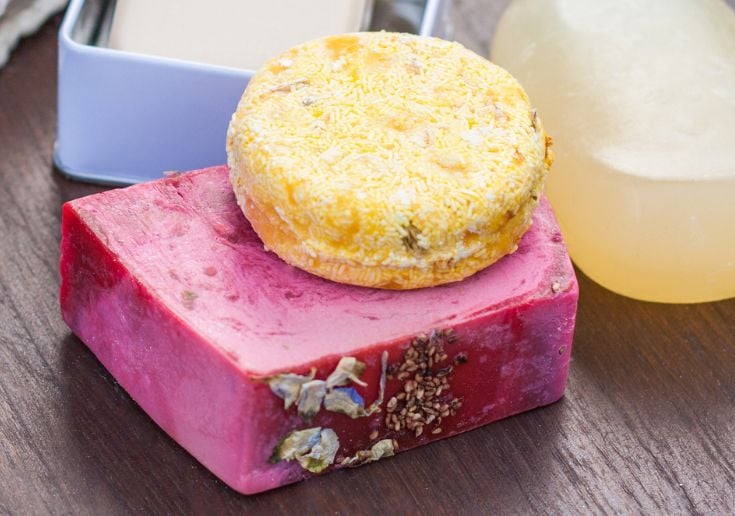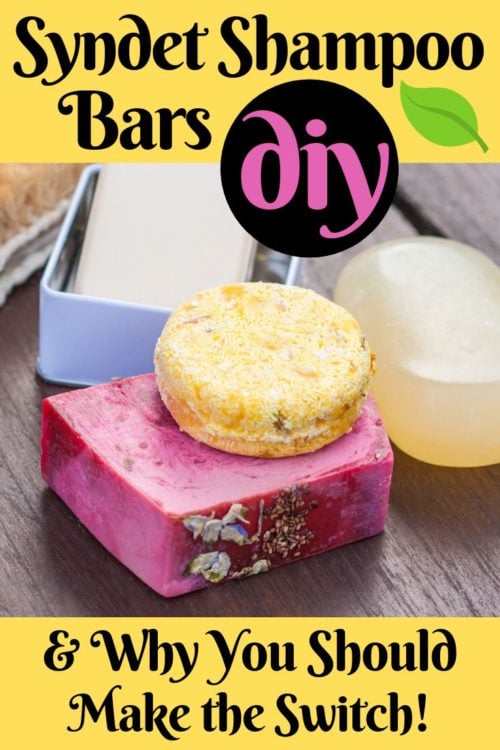
Why I Switched to Syndet Solid Shampoo Bars (Plus How to Make Your Own!)
Learn the benefits of switching to a solid syndet shampoo bars for both hair health and the environment. Syndet solid shampoo bars work just like a regular shampoo – but better! And, unlike cold process or melt and pour soap shampoo bars, there’s no transition period. Only happy, healthy looking hair from the start! Plus they’re gentle on even color treated hair. Keep reading to learn about the benefits of syndet shampoo bars, where to buy them and how to make them.

Making the Switch
As someone who makes my own bath and beauty products, I’ve tried a LOT of different skin and hair care products. Shampoos, however, were always tricky. Castile soap and even cold process shampoo bars left a lot to be desired. The PH of these products just doesn’t work for hair. Which is why it’s suggested you use an apple cider vinegar rinse afterwards. However, from experience and research, this method can actually damage your hair over time. So I’ll admit, I was super hesitant to try the trendy new shampoo bars made popular by Lush.
The new solid shampoo bars are a different approach to hair care. And they aren’t made with soap at all. Known as syndet shampoo bars, these solid shampoo bars are everything you always wanted from your bottle shampoo. And more! The short and long of it is, shampoo bars are pretty amazing!
What Are Syndet Solid Shampoo Bars?
The term “syndet” comes from the combination of the words “synthetic” and “detergent.” It sounds scary, but with the right combination of ingredients, it’s not necessarily a bad thing. By combining variations of different synthetic detergents, a syndet bar is formed. Syndet bars have, in fact, been around a long time. Dove beauty bars, which were first developed in 1955, are actually the first syndet bar.
The one thing syndet bars are not, however, is soap. Likewise, syndet solid shampoo bars also aren’t quite the same as a syndet “soap” bar such as Dove. Like syndet bars, syndet solid shampoo bars are crafted from a combination of mild detergent based cleansers formulated to wash and care for hair. These shampoo bars are typically formulated with a gentle surfactant such as Sodium Cocoyl Isethionate (SCI.) Additional ingredients are then added to nourish and condition hair.
What to Avoid When Shopping for Syndet Hair Care Products
It is important to note, however, that some syndet solid shampoo bars also contain Cocamidopropyl Betaine (Amphosol CG) – which can cause skin irritation – as well as Sodium Lauryl Sulphate (SLS.) For example, the solid shampoo bars sold by Lush contain Sodium Lauryl Sulphate (SLS.) SLS is a harsh detergent based surfactant that can irritate skin which can lead to itchy scalp and dandruff. It also has potentially toxic effects on aquatic organisms. Because of potentially negative effects both on my hair and scalp – as well as the environment – I make sure to avoid shampoo bars containing SLS.
Likewise, I also avoid shampoo bars that contain Cocamidopropyl Betaine (Amphosol CG) as I do have sensitive skin that’s easily irritated by surfactants as well as artificial fragrances. While a milder surfactant, Cocamidopropyl Betaine is made by combining raw coconut oil with 3-dimethylaminopropylamine (DMAPA.) 3-dimethylaminopropylamine is a known skin allergen and sensitizer that can cause both skin and eye irritation as well as an allergic reaction. Cocamidopropyl Betaine is also believed to be toxic to aquatic life. (Learn more here.)
While ultimately the type of shampoo bar you choose for your hair care routine is up to you, I highly encourage you to take the time to read the list of ingredients before making a decision. After all, you don’t want to swap out your liquid shampoo for a solid shampoo bar that leads to the same concerns in regards to the condition and care of your hair and scalp.
The Many Benefits of Syndet Solid Shampoo Bars
Now that you know what solids shampoo bars are – and what they aren’t – following are all of the many reasons I’m head over heels for syndet shampoo bars.
- They lather. Unlike some shampoo bars, such as soap based melt and pour shampoo bars, syndet shampoo bars have a lovely foamy lather that gets hair clean. They also tend to have a better lather than liquid shampoos.
- These solid shampoo bars won’t strip hair of oils and they’re gentle enough for even color treated hair. (I use mine before and after henna treatments for my thinning hair.)
- There’s no plastic waste with solid shampoo bars because there are no bottles. Therefore these little beauties are zero waste & eco friendly. Plus it’s an easy way to reduce plastic waste in your home.
- I can use way less of my syndet bars on my hair than I do for traditional bottled shampoo. Just a few swipes and there’s enough lather to wash my long hair. As a result these bars outlive even a large bottle of shampoo.
- Because they’re made using gentle surfactants, they don’t cause scalp irritation. Unlike my liquid shampoos, I found these bars reduced build up and works like a clarifying liquid shampoo. My itchy scalp stopped itching entirely when I made the switch.
- Shampoo bars have a lower PH than soap based shampoo bars. Therefore there’s no awkward transition period while your hair adjusts.
- Finally, they just work! They do they job they were made to perform better than bottled shampoo brands.

Where to Buy Solid Shampoo Bars
If you’re ready to make the switch, there are a number of handmade bath and beauty artisans that sell homemade syndet solid shampoo bars. Following are some of my favorites – most of which are best sellers on Etsy.
- Tea Tree Shampoo Bar from NMJ Handmade Creations (Buy it.)
- Vegan Friendly Shampoo Bars from Dirt Honey Soap (Buy it.)
- Passionfruit Solid Shampoo & Conditioner from Soul and Soap (Buy it.)
- 2-in-1 SLS Free Shampoo Bar & Conditioner from Green Living Soap Company (Buy it.)
- Orange Peel Shampoo Bar from Mountain Madness Soap, pictured (Buy it.)
- Honeysuckle & Calendula Solid Conditioning Shampoo Bar from East Tn Soap Works (Buy it.)
How to Make Syndet Shampoo Bars
Already in love with this new way to shampoo your hair? Then take the next step in your hair care journey and learn how to make your own syndet solid shampoo bars! These recipes are a great place to start if you’re not quite ready to formulate your own unique shampoo bars.
- Mango Mango Shampoo Bar Recipe from Humblebee & Me
- Snowflake Shampoo Bar Recipe from Humblebee & Me
- SCI Solid Shampoo Bar Recipe Two Ways from DIY Bath & Body Shop
- PH Balanced Syndet Shampoo Bar Recipe from Soap & More
- Syndet Shampoo Bar Recipe & Video from Muddy Soap Company
- Basic Shampoo Bar Recipe by Susan Barclay-Nichols (aka Swift Crafty Monkey)
Want to personalize your hair care formulations? The School of Natural Skin Care offers a free introductory class on how to become a natural hair care formulator. You can sign up to learn more here. Alternately, It’s All In My Hands offers an introductory guide to formulating syndet solid shampoo bars.
For more hair care recipes, including shine sprays and dry shampoo, visit Soap Deli News blog here. You can also explore more DIY ideas via my Pinterest boards. Also be sure to follow me across your favorite social media platforms including Blog Lovin‘, facebook, twitter and instagram. Or sign up to receive my newsletter to stay in the loop.



10 Comments
Cari
July 18, 2019 at 3:36 pm
Thank you so much! I have super thick and curly hair. Solid shampoos just don’t work for my hair, and neither does SLS. I also have eczema, and my skin gets irritated easily, so I need to avoid SLS and other ingredients. Thank you for these recommendations and recipes!
Kyla @ A Life Adjacent
July 23, 2019 at 6:09 pm
This was such an informative article, Rebecca! I was always wary of soap-based shampoo bars because of their high pH. I didn’t even know syndet shampoo bars were an option – you always turn me onto such interesting products and ingredients. I’ll definitely be trying out a syndet shampoo bar.
Michele
July 30, 2019 at 4:49 pm
I am going to make these. Since I am new to soap making, I was wondering if it is possible to incorporate honey in these shampoo bars?
Rebecca D. Dillon
July 31, 2019 at 9:42 am
It’s possible you could use a honey powder. However, it’s not something I’ve tried. I know with real honey you’ll likely need a preservative. Perhaps someone else with more experience can chime in.
Monica Schultz
September 16, 2020 at 12:43 pm
use honeyquat, it’s derived from honey and it’s a great humectant
Gulnaz
September 23, 2019 at 6:08 pm
Hi, i looked at each recipe. So which one do you use if you avoid cocamidopropyl betaine? Every single recipe you linked to has it and some have sulfates as well
Rebecca D. Dillon
September 29, 2019 at 7:09 pm
I actually purchased a bar without that specific ingredient. You can use the recipes as a starting point and sub any ingredients with similar ones that you choose not to use. As syndet bars are synthetic detergents you will come across some with sulfates. However, SLSA is a much gentler alternative than SLS.
Monica Schultz
September 16, 2020 at 12:49 pm
I use shampoo bars for my body rather than my hair because of the pH. I have chronic psoriasis so regular soap which has a pH of 9 is too harsh. Cocamidopropyl Betaine is a mild surfactant and I have personally never experienced any irritation. If you want to avoid it, just replace it with a different mild surfactant like caprylyl/capryl glucoside or foaming oats.
hope this helps
Gerri Davis
October 13, 2020 at 4:12 pm
Can I make these in a crockpot?
Sunny Tune
December 8, 2020 at 10:23 pm
Hey there! My husband and I own East TN Soap Works, I just wanted to say thank you for listing us as an option! I’ve been using our shampoos for 2 years and my hair and scalp have never felt better. We even use them on our 2 and 5 year olds! We recently launched solid conditioners for folks who need some extra soothing during the dry months. Have a great day!
-Sunny
Comments are closed.